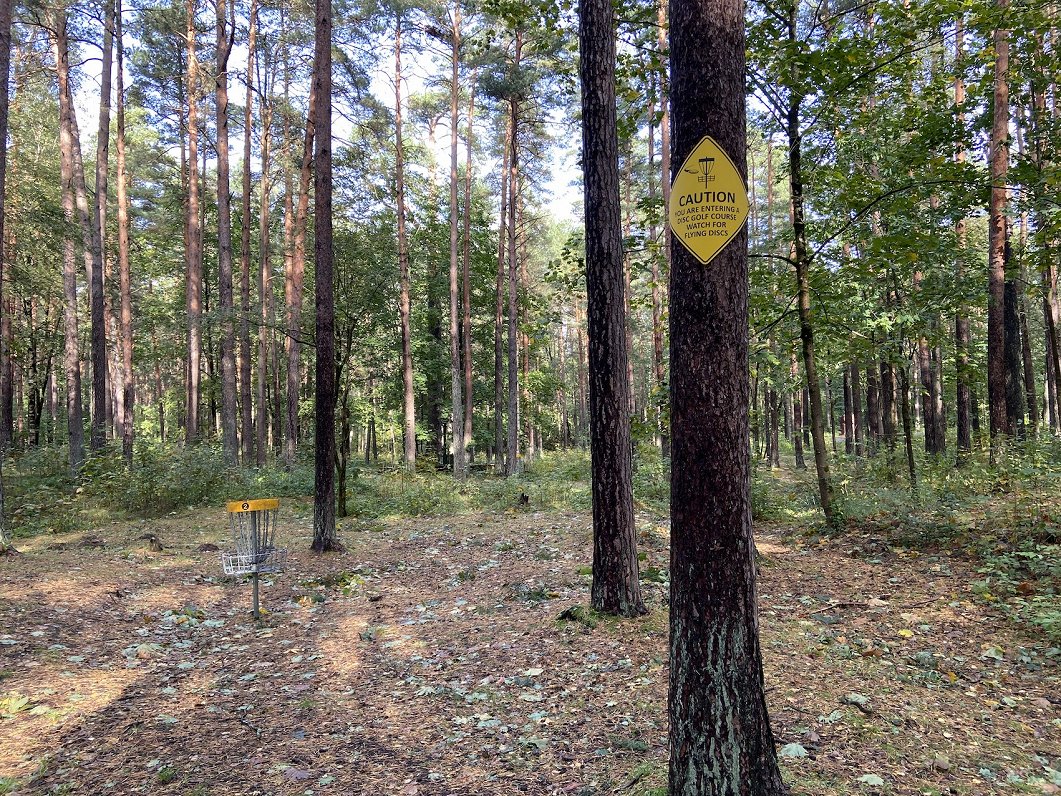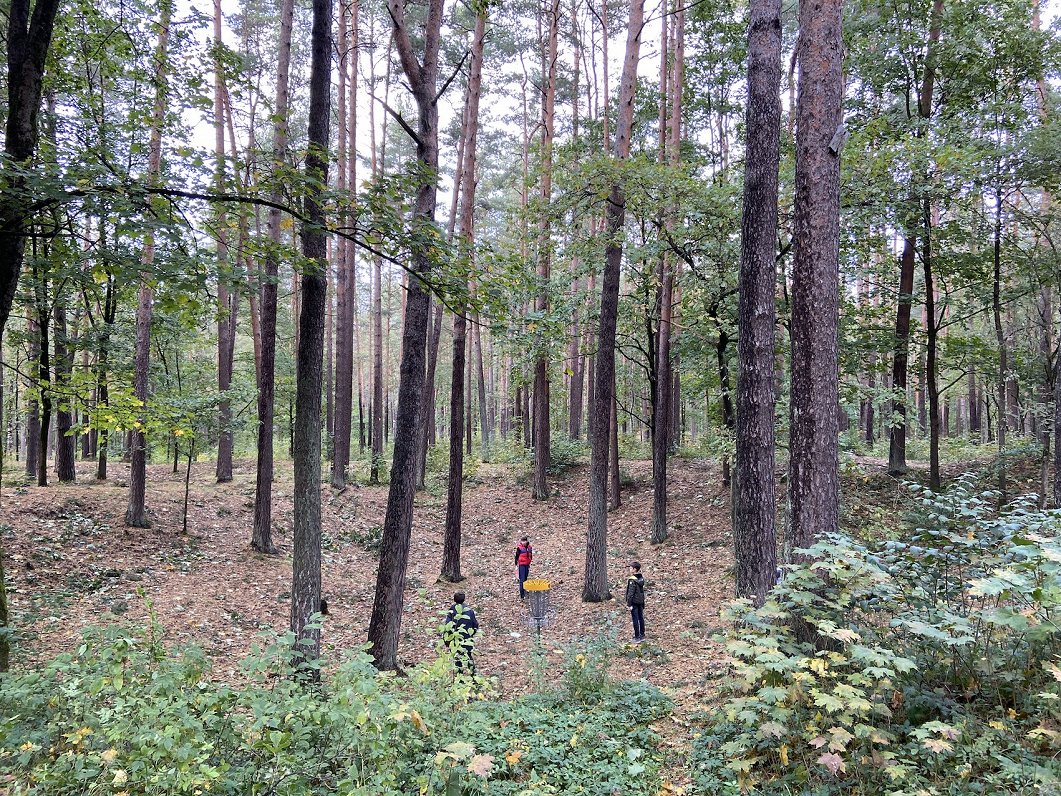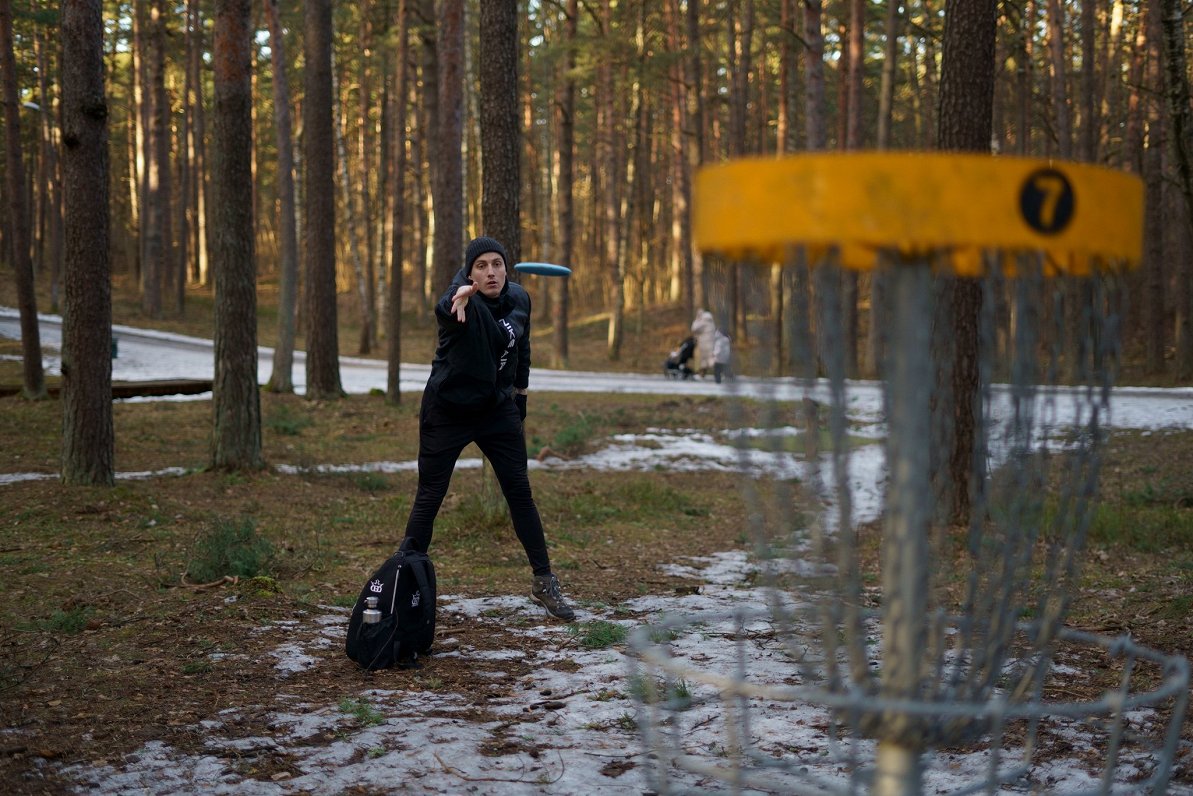And like it they do – the Latvian Disc Golf Federation's (LDGF) map of courses now counts over 40 places to play the game in Latvia – that's almost one for every weekend of the year when playing a round is viable, with high winds and deep snow likely to mean that even the most determined disc golfer will have to miss a few rounds.
“In summer, we see that the courses are even busy in the middle of the day on weekdays. The car parks are full, and you see queues forming. There's no way we can count all the players, but that's one indicator that the sport is growing in popularity,” says Juris Čeičs, president of the LDGF, which was founded in 2017, around ten years after the appearance of the first disc golf course in Latvia.
What the federation can count is the number of licenses it sells. Last year, it was 348, while this year it's already 474. These licenses permit players to participate in the federation's tournaments, which, until late September, had gathered a total of 1,172 participants in 2023. Of those tournaments, 34 were sanctioned by the US-based Professional Disc Golf Association, compared to 23 the previous year.
While the federation, which unites 14 clubs, is driven by voluntary work – its board is not salaried – it receives income from organizing tournaments. Additionally, the state provides limited funding through the Latvian Disc Sport Union (LDSS), of which it is a member. “It's not a lot, but it allows us to buy equipment for tournaments, as well as helps us better prepare our team, send them to tournaments and such,” Čeičs explains.
“This year, we introduced support schemes intended to help our members to organize tournaments and promote the sport, and individual players to take part in tournaments outside Latvia,” he adds.
Disc golf boom powered by volunteers
As Čeičs is not paid for running the federation, I wonder what he gains from the experience. “Emotions, visible progress and the positive response of the community. It's always a joy to see people go home tired and happy after a successful event. Also, seeing how involved our younger generation is and that they see this as not just a walk in the park, but a sport. Involving youth is one of our goals since we can offer a physical activity to get them away from screens,” he answers.

However, Čeičs is honest too about the internal resources it takes. “It's the end of the season, I have a day job and other things going on, so I do feel that my energy levels are running low. Besides, winter is no time for rest for the federation as we plan ahead for the next season. You lose the time you once had to play,” he says.
With the rise in popularity of disc golf in Latvia, the players' expectations are growing and the federation is taking on more responsibility, aware that the developments call for more structure. Currently, it is speaking to a potential sponsor.
“If it works out, I'm confident we'll be able to take things to the next level,” says Čeičs, explaining that the extra funding could go towards hiring someone to better manage the tournaments, look after marketing and administrative tasks.
Čeičs brings up a specific challenge that the federation faces – choosing where to host their tournaments since courses are popping up like mushrooms after rain. I wonder, what has sparked this?
“It's fostered by all the different places that our active players live in. They themselves initiate new courses. Of course, if they succeed in convincing the local council, they get involved too. That's the ideal model because disc golf is about attracting people. They come for a game, go to a local cafe and might stay somewhere. Sports tourism! Plus, it's also a great way for locals themselves to spend their free time. The key is for the course to be close to the people, so that it's not difficult to reach,” Čeičs outlines.
Disc golf course maintenance – a community endeavor
Rolands Gruzītis is the owner of the Lettes disc golf course near Lubāna. Around seven years ago, his friends took him to the course in Ērgļi, Rolands instantly fell for the game and set his mind on building a range on his own property.
Winter went by welding his first disc golf baskets. In Rolands' words: “I did it for myself. I like doing things, and this seemed like a fun, interesting activity.” In spring, he invited his friends and family to give the game a go, and that's how it all began. The circle kept growing.
Since then, Lettes has grown to be the home of a club, which is a member of the LDGF, and to host tournaments. People turn to Rolands for advice on developing their own courses. “Building it is the easiest part. The hardest is maintaining it. Thank goodness for the club and our members! We organize collective clean-ups. Members show up with string trimmers, I'm on the big tractor and someone's on the smaller one,” he reveals.
“Our course is around 10 hectares. To mow that takes about two days, and you have to do it at least three times, if not four or five a year. I'm also always looking for ways to improve the course – some new configuration or a new platform. We try to keep it interesting and make it more challenging,” Rolands says of the realities of running a range.
Together with the club, Rolands also set up a six-basket course in Lubāna for people who can't get to Lettes or are shy. In this way, they have drawn several new players to Lettes who have later gone on to join tournaments.
“The more of us there'll be, the better,” Rolands says. “Disc golf is a really great way to spend your free time. One might think of it as a sport, while for someone else it's pure entertainment.”
Friends draw each other into the game
Linda Lagzdiņa, Oskars Pūcītis and Mārtiņš Kadass are a group of friends who play together, having started during the pandemic when entertainment was limited and options for mingling scarce. It was other friends who first lured them into the game, illustrating the sport's “magnetic” quality.

“I like spending time outdoors and hanging out with my friends, and disc golf is the perfect opportunity to combine the two. I'd have started playing sooner if I'd known about it! This year, I took part in my first few tournaments and felt the rush of a competition. It's now very much a hobby, and I find myself wanting to play more and more,” says Mārtiņš.
“To me, it's entertainment that comes with a certain level of physical exertion, depending on the range. Even without throwing the discs, the Riekstukalns course is a workout, for example,” shares Linda. “After a game you feel like you've achieved something,” she adds.
“You experience both pleasant and not so pleasant emotions. You feel great after a good throw but not so much if you've hit a tree. I always say it's a love-hate relationship. But, the more I play, the less the bad throws get to me,” Oskars laughs.
Čeičs also highlights the importance of playing on a regular basis if you really want to get into the game. “Provided your coordination is ok, progress is fast. Once you've got the hang of it, you want to become faster. After that it's a case of honing your technical skills to further improve, which is harder and more challenging, but as long as you play somewhat regularly, you do get better. Disc golf isn't just about the result,” he says.
While the active season is drawing to a close in October, not all disc golfers are giving up for the colder months of the year. “You can play in winter, too. When you're past the age of hitting the slopes with your toboggan, you want an alternative,” Čeičs says.
Interestingly, disc golf has become particularly popular among countries of the global north with distinct winters. Iceland, Finland and Estonia top the charts for most courses per capita, but Latvia and Lithuania aren't far behind. Nothing like a bit of friendly regional rivalry to encourage development!






























